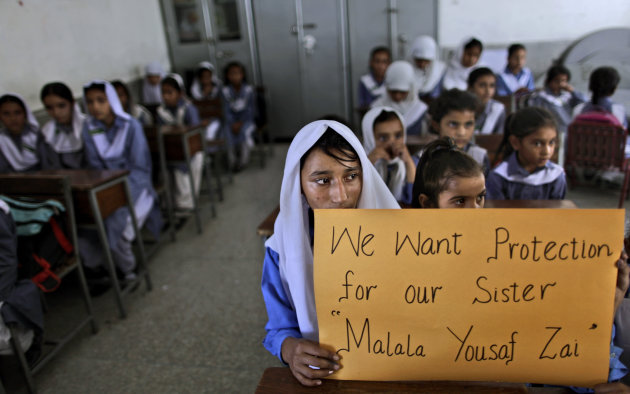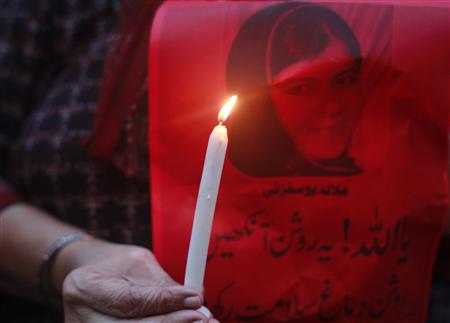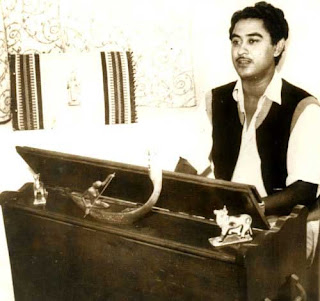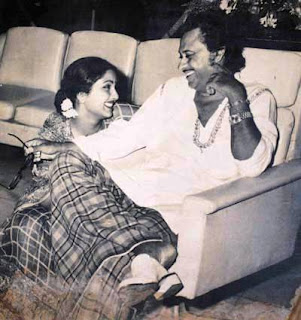“Which one of you is Malala? Speak up, otherwise I will shoot you all,” a hooded, bearded Taliban militant asked a bus full of schoolgirls on their way home earlier this week. “She is propagating against the soldiers of Allah, the Taliban. She must be punished,” the Taliban militant shouted louder. Then, recognizing her, he shot her at a point blank range.
Malala Yousafzai gained fame when it came out that she was the girl who was highly critical of the Taliban’s ban on girls’ education in theSwat valley, and blogging about her views and about the atrocities of Islamic militias controlling the valley from 2007-2009. The BBCblog, which was written in Urdu under a pen name, was nominated for several awards.
“I wanted to scream, shout and tell the whole world what we were going through. But it was not possible. The Taliban would have killed me, my father, my whole family. I would have died without leaving any mark. So I chose to write with a different name. And it worked, as my valley has been freed,” she told me when I invited her for an interview for the TV station I am heading now, ARY News.
RELATED: Who are the Taliban and what do they want?
Doctors treating Malala now say bullets have been removed from her head and neck, but her condition is still critical. The Tehrik-e-Taliban Pakistan (TTP) have claimed responsibility for the attack and have a $100,000 government bounty against them.
Malala’s friend, Shazia, who was also injured that day, recounted the event to me as her eyes filled with tears.
“They stopped our school van. They were riding on a bike. The masked man kept pointing guns at us and the other was shouting ‘where is Malala?!’ I froze with a flashback to the old dark days: I remembered the headless bodies, slaughtering of rivals – merely on dissent or slightest doubt of spying –the grotesque violence.”
Just a few moments before, she said, the girls had been singing a traditional Pushto folk song on their way back from school, its lyrics vowing sacrificing their lives for their motherland, the beautiful valley of Swat.
“With a drop of my sweetheart’s blood, Shed to defend the motherland, I will put a beauty spot on my forehead, Such would put to shame the rose in the garden,” they sang. The song was made famous by Malala’s namesake, Malalai of Maiwand. The 19th century national folk hero fought against the British troops in the Second Anglo-Afghan War.
WHAT’S IN A NAME?
The first time I met Malala, a couple of years ago, I asked her what her name signified. She answered: “Probably, a hero like the Afghan heroine Malalai [of Maiwand] or Malalai Joya. I want to be a social activist and an honest politician like her,” she said, smiling. Ms. Joya, a 30-something activist, politician, and writer who was bitterly critical of both the Taliban and the Karzai regime, was at one point dubbed the bravest woman of Afghanistan.
Malala Yousafzai certainly was well on her way for a 14-year-old. She was awarded the National Peace Award in Pakistan last year. At the time, she said: “My life is like a movie, full of dreams. I used to dream of becoming famous, to see my valley freed from the clutches of Taliban, to see girls flying like butterflies, free from any restrictions. It is becoming as a reality so I am happy, happy, and very happy,” she said. “I want to change the political system so there is social justice and equality and change in the status of girls and women. I plan to set up my own academy for girls,” she said, ever with confidence and a maturity beyond her years.
I remember thinking it was her love for life that made countering the Taliban possible.
ENGRAVED IN MEMORY
Under their control of the Swat valley, the turbaned militants burned schools and banned girls’ education, and forced women to wear burqas or stay inside their homes, turning Malala’s colorful valley of Swat colorless. That period is engraved in people’s memories through her diary.
“Saturday January 3, 2009: Today our headmistress announced that girls should stop wearing uniform because of Taliban. Come to schools in casual wear. In our class only three out of 27 attended the school. My three friends have quit school because of Taliban threats.”
“January 5, 2009: Today our teacher told us not to wear colorful dress that might make Taliban angry.”
“Tuesday March 2009: On our way to school, my friend asked me to cover my head properly, otherwise Taliban will punish us.”
“Thursday, March 12, 2009: I had a sore throat. My father took me to the doctor. There a woman told us about a boy named Anis, ‘Anis was with Taliban.’ His Taliban friend told him that he had a dream that he is surrounded by heavenly virgins in Paradise. The boy then asked his parents if he could become a suicide bomber to go to the Paradise. The parents refused. But Anis exploded himself at a check post of security forces, anyway.”
When the security forces carried out the operation to oust the Taliban in the Swat valley, Malala had to leave her valley, as did almost a million other displaced people. I met her while she was teaching children under a tent, as most of the schools were destroyed by Taliban in Swat. “I want to see every child getting education and our whole country freed from Taliban,” she told me, gesturing to the surrounding mountains.
Archives: A special report from Swat Valley in 2007
Today, security officials say her attackers might have come down from those same mountains, either across the border where Mullah Fazlullah who had occupied Swat valley and now believed to have been in hiding in Nooristan and Kunnar provinces in Afghanistan, or from North Waziristan, which is considered to be a haven for Al Qaeda and Taliban militants.
Three years ago, a military operation followed the flogging of a girl from Swat, Chand Bibi, at the hands of Taliban, which triggered anger across the country. Now the attack on Malala has triggered nationwide anger and international condemnation, and there is some hope that it will effect a change again.
Pakistan’s military chief visited the military hospital Wednesday to see Malala. “Such inhuman attacks clearly expose the extremist mindset the nation is facing,” Gen. Pervez Ashfaq Kayani said in a statement. “We refuse to bow before terror, we will fight. Regardless of the cost, we will prevail, inshallah,” the military chief said, triggering speculation that this attack might spur Pakistan’s military to go into North Waziristan.
UNFLAGGING DETERMINATION
Malala, with her rosy complexion, twinkling eyes, and unflagging determination, charmed everybody with her courage and confidence in her public appearances. Fluent in Urdu, English, and Pushto, she had a flair for communication.
Her father, Zia Yousafzai, a Pashtun left-wing educator, almost always accompanied her on outings and interviews. He runs a chain of schools in Swat valley, the Khushal Public School, named after a famous Pashtun poet. I met father and daughter many times, and discussed with Malala the possibility of her hosting a show to interview leading politicians and dignitaries for the TV channel where I work.
“That will be fun, countering mullahs,” she replied, but said she wanted to focus on her studies. Her father, bursting with pride, was cautious. “It’s not the right time. She has already been in limelight in the national and international media. Her life can be under threat and she has to go a long way,” her father told me.
The last time that I was with Malala, my 9-year-old daughter, Risa, called me to ask when I was coming home.
“I am with a hero, a very courageous girl. She has defeated the Taliban,” I told her.
“The horrible Taliban? She must be so brave. Can I talk to her?” my daughter asked, and the girls chatted on the telephone for a few minutes.
On Tuesday, when my daughter called me, Malala was being rushed to the hospital. When I spoke to Malala’s father, he said he was standing next to her, holding her hand. “Don’t worry, Baba. I am going to be fine and victory will be ours,” he said Malala told him in broken words before falling unconscious.
I came home that day heartsick and angry. My daughter had fallen asleep on top of her book titled “Mulan,” a folk tale we have read together about a heroic Chinese girl who fought against Mongols and saved her village. I held her tight, trying not to wake her because she had school the next day – which was Malala’s drea

 Enlarge Gallery
Enlarge Gallery
 Enlarge Photo
Enlarge Photo Enlarge Photo
Enlarge Photo








